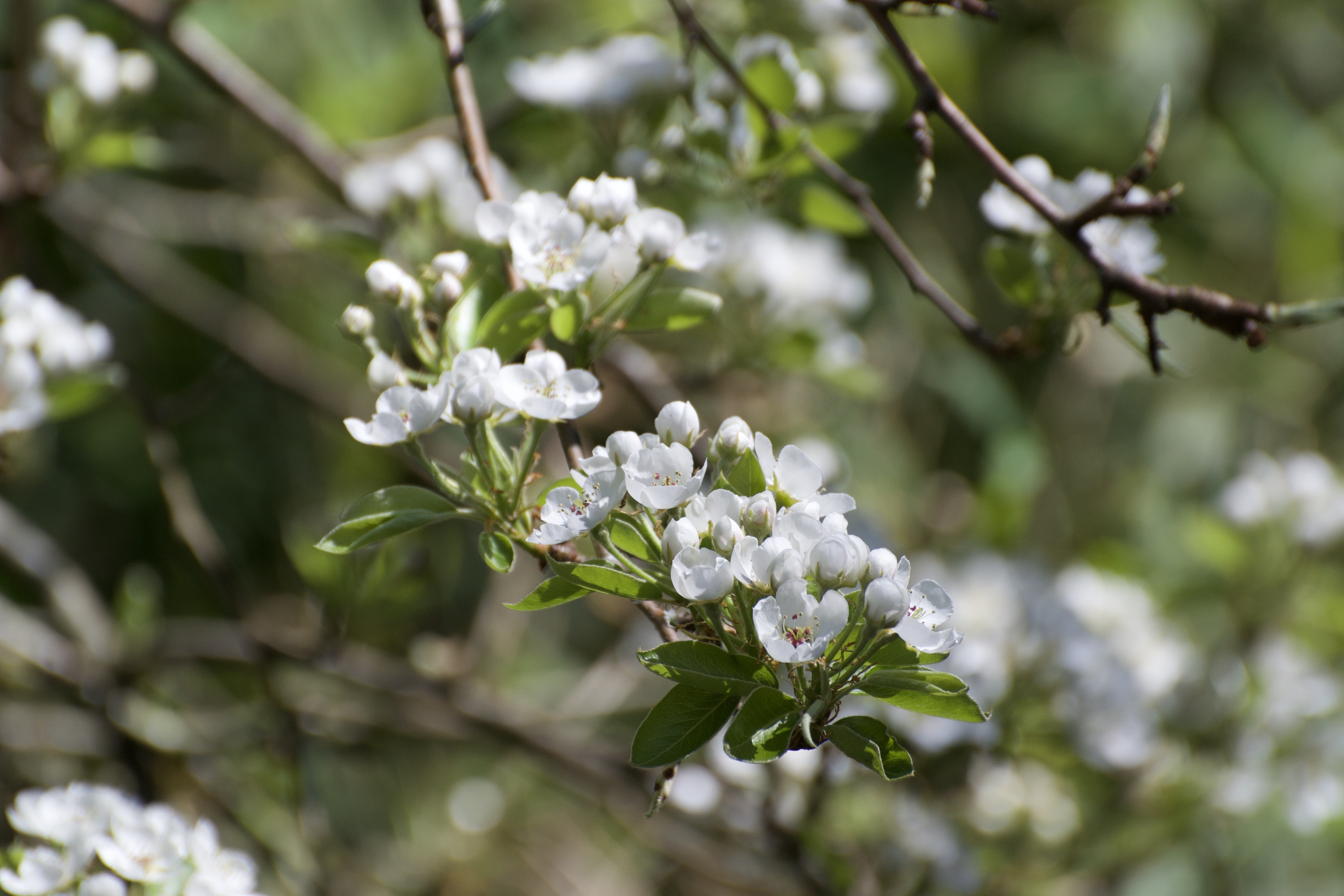Over the last 2 weeks or so I have occasionally photographed the buds that were sprouting on the pear tree in front of my window. Growing at record speed they finally opened into the most luminous blossoms when the weather turned warm this weekend. Photographs today are in order of dates taken.

When searching for an appropriate poem to go with the images, I came across the words below, by a poet who, I admit, I’d never heard of. Before you yell at me how I dare to offer something that contains an offensive term for the deaf and hard of hearing community in the title, bear with me. The words used have a rhetorical purpose – they activate commonly held negative stereotypes before the poem forces us to completely shift perceptions.

Deaf-Mute in the Pear Tree
BY P. K. PAGE (1916 – 2010)
His clumsy body is a golden fruit
pendulous in the pear tree
Blunt fingers among the multitudinous buds
Adriatic blue the sky above and through
the forking twigs
Sun ruddying tree’s trunk, his trunk
his massive head thick-nobbed with burnished curls
tight-clenched in bud
(Painting by Generalíc. Primitive.)
I watch him prune with silent secateurs
Boots in the crotch of branches shift their weight
heavily as oxen in a stall
Hear small inarticulate mews from his locked mouth
a kitten in a box
Pear clippings fall
soundlessly on the ground
Spring finches sing
soundlessly in the leaves
A stone. A stone in ears and on his tongue
Through palm and fingertip he knows the tree’s
quick springtime pulse
Smells in its sap the sweet incipient pears
Pale sunlight’s choppy water glistens on
his mutely snipping blades
and flags and scraps of blue
above him make regatta of the day
But when he sees his wife’s foreshortened shape
sudden and silent in the grass below
uptilt its face to him
then air is kisses, kisses
stone dissolves
his locked throat finds a little door
and through it feathered joy
flies screaming like a jay
From The Glass Air: Selected Poems.– 1985

Deaf and dumb used to be one of the earliest of all the negative associations with those who cannot hear or use spoken language. It was coined by Aristotles, who believed that the absence of hearing implied the absence of learning, leaving the person unable to reason, thus dumb. The phrase was later intended to describe not hearing and not speaking, eventually changed to deaf mute, with identical definition – much to the justified ire of the deaf and hard of hearing community who points out how many ways of communication their members have, including their very own language. The horrid associations for those who live with deafness as being not quite right can be found across cultures and religions – an informative source for historical tidbits can be accessed here, famous rabbis and Martin Luther among the more rabid lunatics when it came to stigmatizing the other.

The poet obviously moves from the introduction in the title to further negative descriptions of the man in the pear tree. His body is slightly misshapen, his fingers stubby, his head massive, his utterances the mewing of a kitten and his movement of the slowness of oxen in the barn – suggesting some chromosomal mishap, if not proximity to animals more than humans.
But then something shifts. He does delicate work with the secateurs, and even though a stone clogs his ears and weighs down his tongue, he has other modes of perceptions, highly sensitive. He feels spring’s life pulse through the tree with his touch, he smells the future in whiffs of sap, and he sees a world of sunlight and blue sky translated into summery panoramas, freely sailing off.
The joy is multiplied when his wife on the ground tilts her face at him, and his love for her enables an articulated response, pure happiness. He is loving and beloved, the healthiest, most human state of all. How many readers can remember a time at all where we screamed with joy at the closeness of a loved one? What is wrong with US?

There remains one riddle: (Painting by Generalíc. Primitive.) What does that line seek in the poem?
Ivan Generalic was Page’s contemporary, a Croatian farmer and autodidactic painter, among the most famous in the European Primitivist movements. Page was a painter herself, and I wondered if she was drawn to one or another of his paintings that would deliver the template for the imagery. All I could find was a couple underneath a pear tree. Maybe the poetic imagination described what unfolded before that reunion.
Or, alternatively, she is using the coinage of primitivism to have us look at something that is not primitive at all. Generalic’s work was suffused with critical political commentary of farmers’ and workers’ lots, superstitions in rural areas, the burdens of religion and so much more. The analogy of taking a second look behind what is perceived as primitive at first glance, and correcting our assumptions, is a tempting interpretation of the poem as well.

Music from Croatia, across a century.







Sara Lee Silberman
Lovely photos! [Spring is, as it were, “busting out all over” in Canton today, too, and what a delight!]
Poem printed too small for me easily to read….
Renate Funk
Please check “The Idiot Boy” by William Wordsworth. It is one of the most moving poems I know, and due to its time, does not make excuses for bad language.